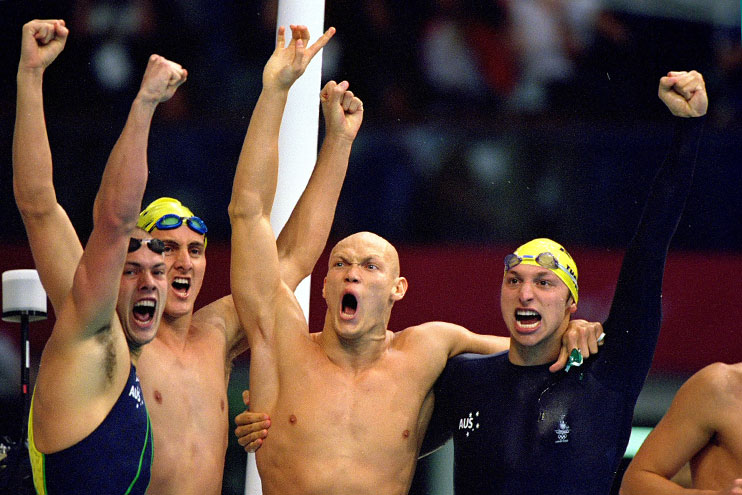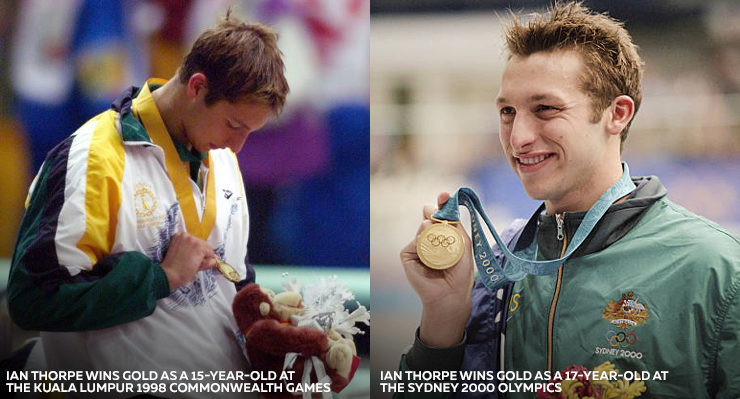
The Sydney 2000 Olympic Games highlighted everything that is great about Australian sport, according to Commonwealth Games Australia CEO Craig Phillips.
On the 20th anniversary of the Opening Ceremony of the Sydney 2000 Olympic Games, Commonwealth Games Australia CEO Craig Phillips looks back fondly on a time that showcased just how good Australian sport can be when working together for a common objective.
The Sydney 2000 Olympic Games were a triumph for a nation who demonstrated not only the capacity to host a great Games, but the vibe and enthusiasm of the 45,000 volunteers, millions of spectators in the stands and fans at home who watched on television.
And the Paralympic Games that followed set a new benchmark for Para-sports, the legacy of which continues today with the integration of Para and able-bodied athletes at the Commonwealth Games.
Phillips was Director of Sport at the Australian Olympic Committee in 2000 and looks back fondly on the entire period from the moment Australia and Sydney were announced in the early hours of September 24, 1993 as hosts of the Games of the XXVII Olympiad.
“From the moment when Sydney was declared the winner, the Australian sport system came together, with the significant help of Governments all around Australia, to deliver a great Games,” Phillips said.
“We already knew that as a nation we were great hosts. As we had done in Melbourne in 1956 and through the Sydney, Perth and Brisbane Commonwealth Games, and there’s no doubt that the subsequent Melbourne and the Gold Coast Commonwealth Games benefited from the Sydney Games experience.”
Australia won 16 gold medals in Sydney, along with 25 silver and 17 bronze for 58 medals which remains Australia’s best total medal return from the Olympics.
Phillips said Commonwealth Games Australia was proud of its contribution to the success of Australia’s athletes at the Sydney Games.
“As is always the case, Commonwealth Games Australia knows and understands our important role in the Australian sports system. Our sports and their athletes, coaches, and volunteers all were firing on all cylinders for the seven-year build up to the Games,” Phillips says.
“During that time, we had two editions of the Commonwealth Games, in Victoria in 1994 and Kuala Lumpur in 1998 and these Games had a significant role in the success of the team in Sydney.
“It is interesting to look back on our gold medallists from Sydney. For those from Commonwealth Games sports, every single individual gold medallist had competed in a previous Commonwealth Games. From Cathy who made her debut as a 16-year-old in Auckland a decade earlier, to Ian Thorpe, Grant Hackett and Susie O’Neill who dominated in KL in 1998, plus Michael Diamond.” — Commonwealth Games Australia CEO Craig Phillips
“In fact, two years to the day, 16th September, after winning his fourth gold medal as a 15-year-old in KL, Ian Thorpe won our first gold medal in Sydney.
“More than half of the Hockeyroos, the entire men’s 4x100m freestyle team, five of the six who swam in the 4x200m heats and finals and both Scott McGrory and Brett Aitken who won the track cycling madison, they all had international experience from the Commonwealth Games under their belt.
“For the entire lead up, all in the Australian sporting system worked together – from the AOC, Commonwealth Games Australia to the AIS, State Institutes and sports, we were all totally in sync. While we didn’t always agree, there was a unity of purpose under strong focussed leadership. Unfortunately, apart from brief periods, we have not seen its like in the Australian sports system since.”
Of the 632 members of Australia’s largest ever Olympic team, Commonwealth Games sport athletes numbered 286 and 148 of those (51%) had previously competed at the Commonwealth Games.

“This is interesting in hindsight, as we are currently debating with the AIS about the contribution the Commonwealth Games can make to our medal tally in Paris in 2024 and at future Olympic and Paralympic Games. Sadly, the AIS hierarchy are of the view that the Commonwealth Games has little value and should be de-prioritised. This attitude is demeaning of our member sports and our athletes – past, present and future,” Phillips said.
“Clearly the facts don’t support this, however the AIS leadership is of the view that athletes go from zero to hero in an instant and they only want to support athletes with ready-made Olympic medal winning potential.
“The AIS’s current position isn’t supported by the National High Performance Sport Strategy, which calls out the importance of the Commonwealth Games, and we will continue to discuss with the board of Australian Sports Commission and the Minister the important role the Commonwealth Games has in the aspirations of our developing athletes, the 16-year-old Cathy Freemans of the future, all the way to our Olympic champions.
“If the AIS’s current thinking had prevailed in the early 1990s, Cathy Freeman may never have been supported. Australia and the world may have been denied a great Olympic champion and the power of her performance in the history of our first Australians.
“Despite the AIS being keen to give up on these athletes, we won’t.”
The Sydney Games heralded a golden era for Australian sports – from 1993 through until the Melbourne 2006 Commonwealth Games, and then to Beijing in 2008.
“We had our best ever Commonwealth Games in terms of gold medallists in Victoria in 1994, even better than Melbourne in 2006. And our best ever medal tally at an away Games in Manchester in 2002… which contributed to our best gold medal return from an Olympic Games ever in Athens in 2004,” Phillips observed.
Of course, we would like to host another home Commonwealth Games in 2026 or 2030 and are fully supportive of the 2032 Olympic and Paralympic bid from Queensland.
“We all benefit when the green and gold is on show at home… and as we reflect on those 17 days in Sydney, we remind ourselves of the decade long benefit those Games delivered for Australian sport,” Phillips said.
Australia at the Commonwealth Games, Olympics and Paralympics – 1994 – 2008:
| GAMES | TEAM SIZE | GOLD | SILVER | BRONZE | TOTAL MEDALS | RANKING |
|---|---|---|---|---|---|---|
| 1994 Victoria (CG) | 241 | 87 | 52 | 42 | 181 | 1 |
| 1996 Atlanta (OG) | 424 | 9 | 9 | 23 | 41 | 7 |
| 1996 Atlanta (PG) | 161 | 42 | 37 | 27 | 106 | 2 |
| 1998 Kuala Lumpur (CG) | 311 | 79 | 61 | 56 | 196 | 1 |
| 2000 Sydney (OG) | 632 | 16 | 25 | 17 | 58 | 4 |
| 2000 Sydney (PG) | 286 | 63 | 39 | 47 | 149 | 1 |
| 2002 Manchester (CG) | 355 | 81 | 61 | 63 | 205 | 1 |
| 2004 Athens (OG) | 482 | 17 | 16 | 17 | 50 | 4 |
| 2004 Athens (PG) | 152 | 26 | 39 | 36 | 101 | 5 |
| 2006 Melbourne (CG) | 425 | 84 | 69 | 68 | 221 | 1 |
| 2008 Beijing (OG) | 433 | 14 | 15 | 17 | 46 | 6 |
| 2008 Beijing (PG) | 161 | 23 | 29 | 27 | 79 | 5 |
Note: Since the introduction of Para-sport events at the Commonwealth Games in 1994, the events have been integrated into the overall medal tallies, with no distinction between able-bodied and Para-sport events and medals.
